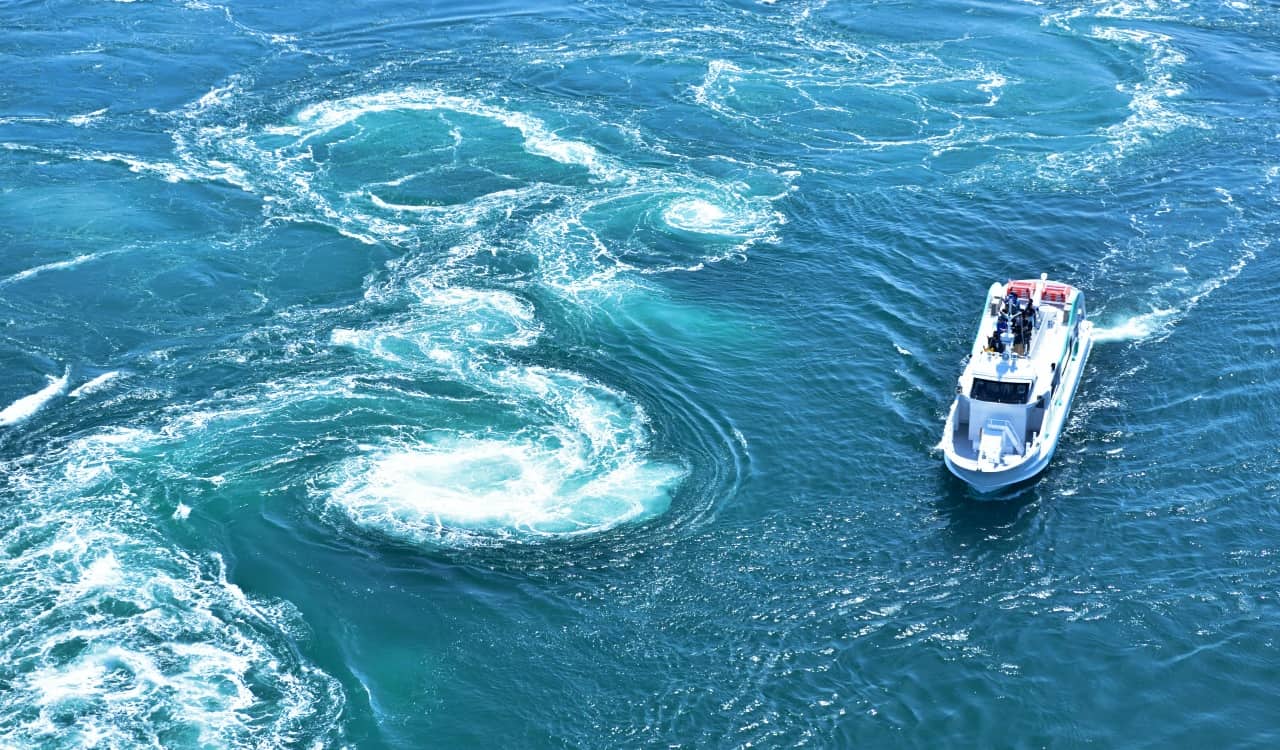Thalassophobia happens to be an intense fear of deep bodies of water. This could include the sea or ocean but also things as simple as pools, lakes, and rivers. It should be noted that this is not the same thing as aquaphobia or the fear of just water itself. Those with thalassophobia can handle water, especially when it comes to something like a bath or jacuzzi. The real issue is deep bodies of water and what takes place inside of them.
That might mean something like waves, large or small. It could also mean something like aquatic creatures or even something like a ship sailing away from land. This phobia can be different for all, so some stuff can make people a little uneasy while it does not bother others. If you struggle with this phobia, there is help through counseling/therapy. Many therapists will tell you exposure therapy is best for dealing with fears, so we decided to trigger people a bit with some images. Let’s get started!
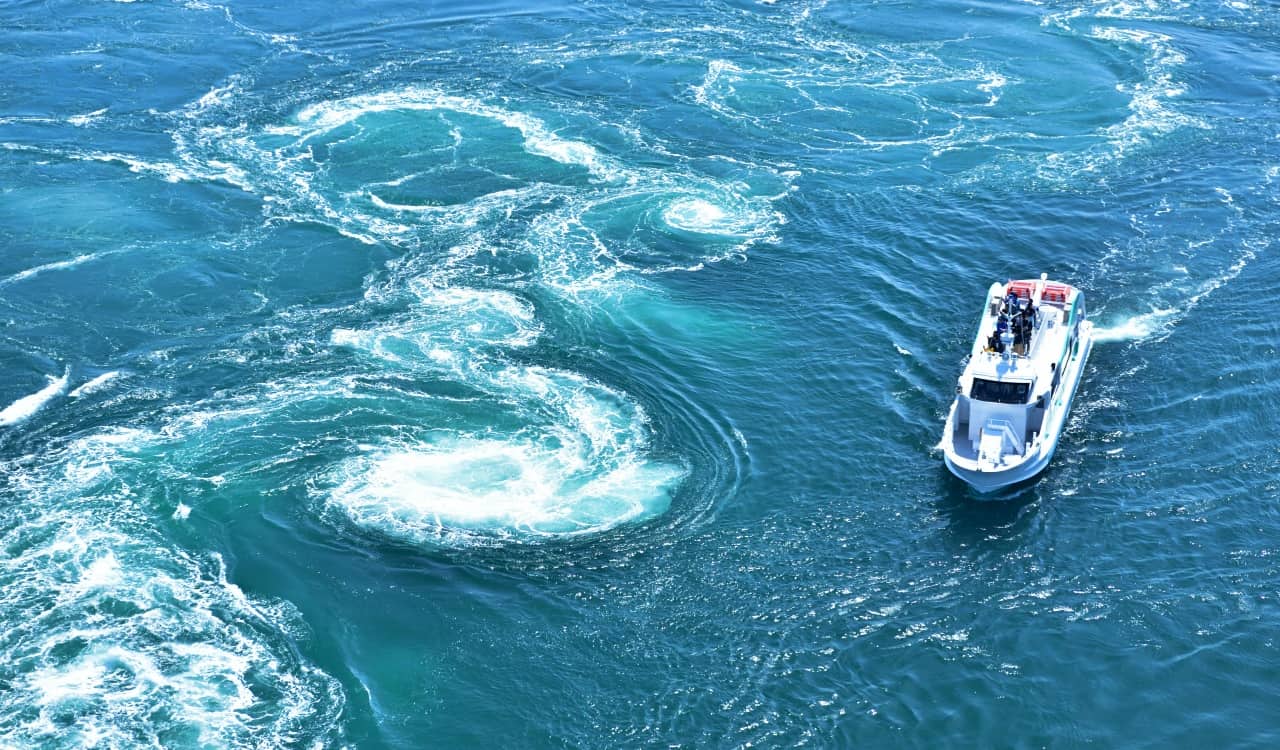
The World’s Largest Whirlpools
Whirlpools are pretty weird natural phenomenons. You do not need to have thalassophobia of any kind to find them scary, because they can certainly be dangerous. The image above involves the world’s largest whirlpools found in the Naruto Strait in Japan. The whirlpools move at a speed of just under 10 mph when they pop up around four times daily. They flow in twice and flow out twice. Sometimes, during Spring tides, the speed will change. Thus creating vortexes of up to 66 feet in diameter!
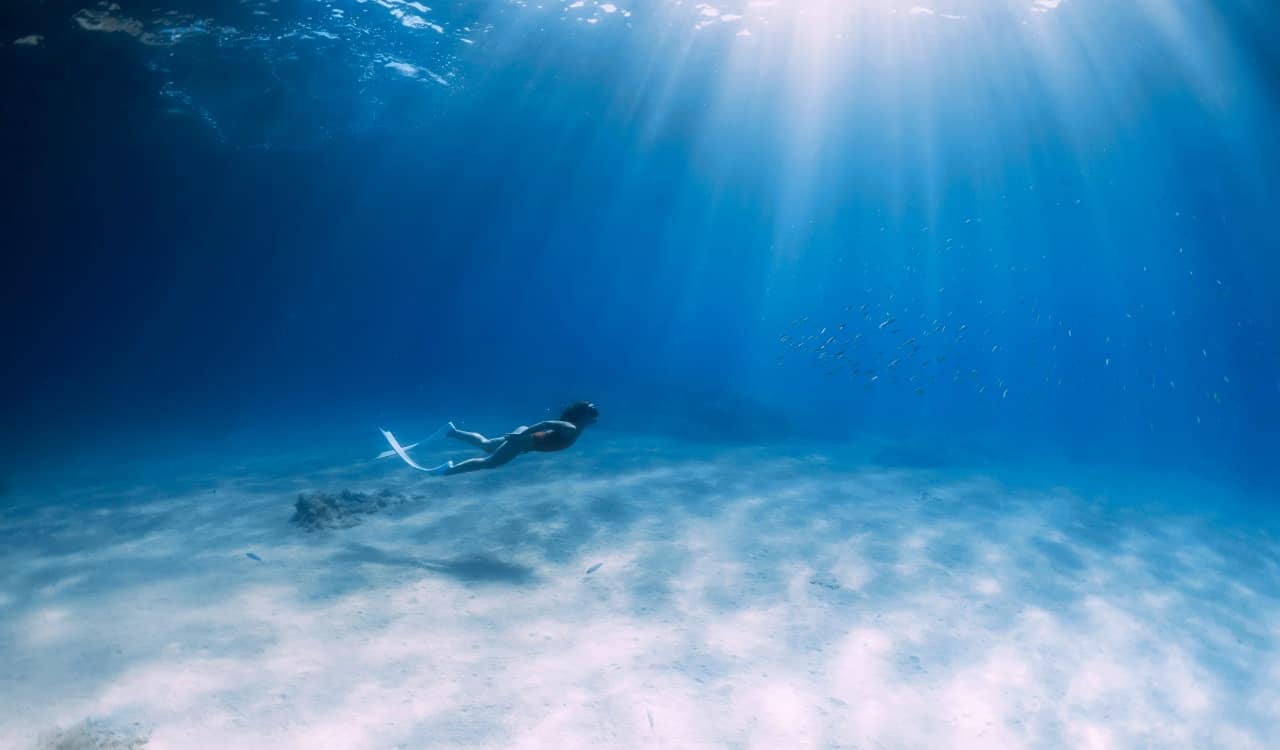
Freediving Into The Unknown
Freediving can be a very fun experience for people who enjoy that type of thing. Of course, if you have something like thalassophobia, you’re likely not a fan. Freedivers will opt to hold their breath rather than rely on any major diving equipment or SCUBA gear. Obviously, most freedivers are excellent swimmers and can hold their breath for minutes at a time. Yet this woman is swimming into the unknown without much to guide her. That makes even this writer a bit anxious.
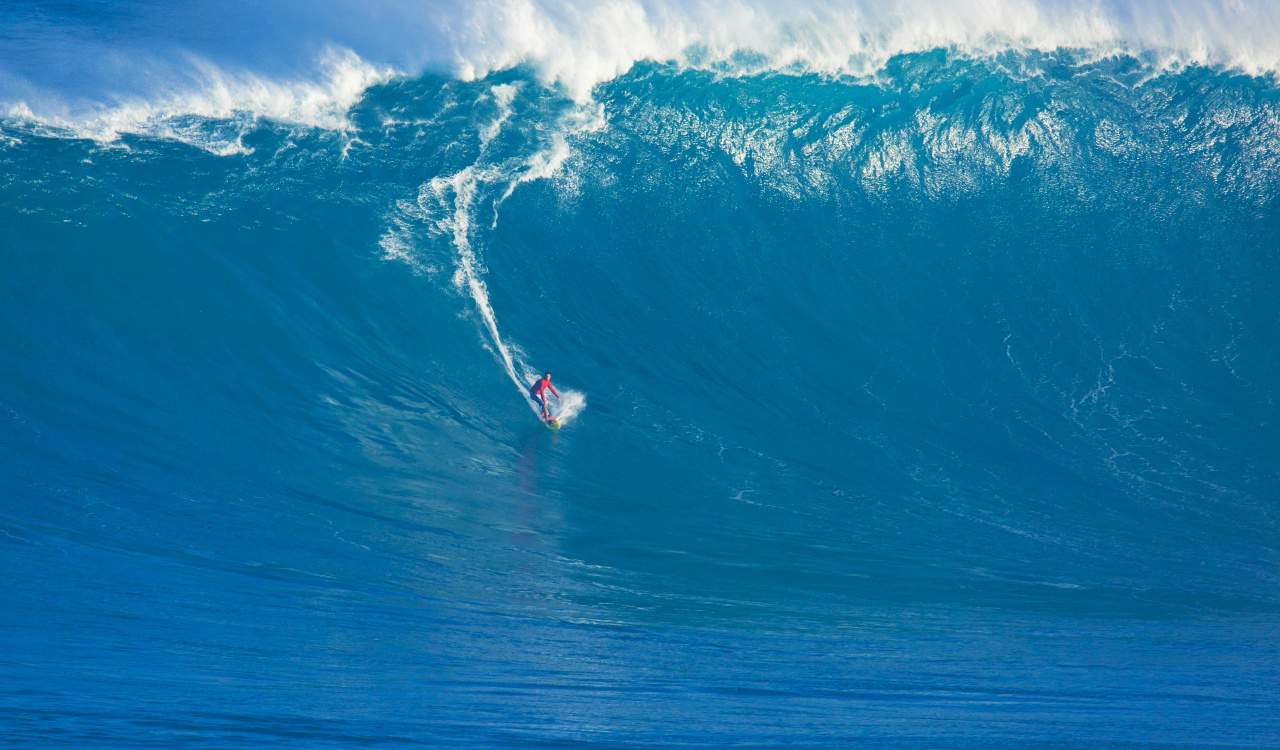
Surfing The Big One
Surfing is a beloved past-time for thousands of people. Of course, the best surfers have likely caught waves in some of the most beautiful of places. Yet every surfer, even those who barely do it, will have a story of how they caught a huge wave. In this image, we see a surfer catching what ended up being a 30-foot wave in Hawaii. Maui often has some of the largest waves in the world, making it a big destination for surfers. Waves have regularly reached 30 to 50 feet there!
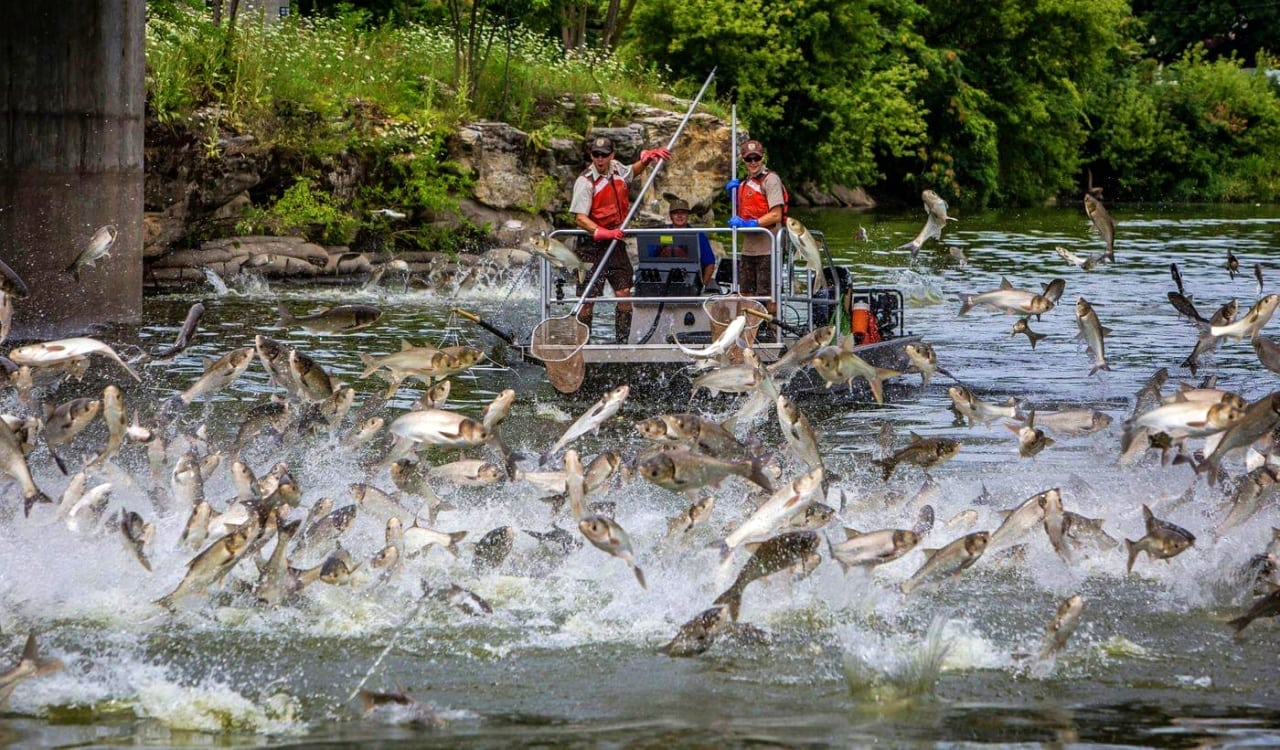
The Abnormal Jumping Silver Carp
Whether you have thalassophobia or not, this fish species is known to freak out most it comes in contact with. It is known as the Silver Carp, and it is an invasive species found throughout the Mississippi River. It’s uncertain when it was introduced to the river, but the first sighting was in 1999 and it has since sprouted into 12 states. These fish grow to the size of a small child and will jump heavily when boats come by. They might smack you in the face, break rods, and scare the crap out of you!
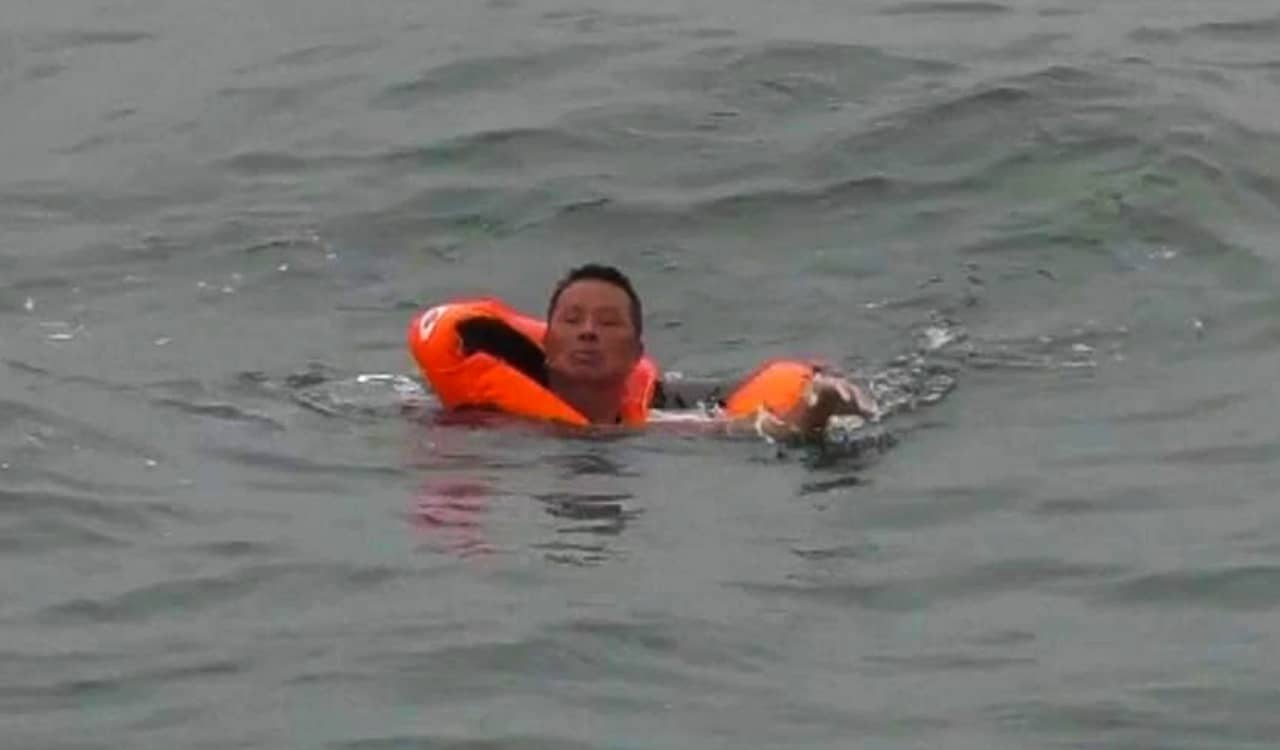
Man Rescued After Shipwreck
If you have thalassophobia, it is likely you’d avoid getting on a ship at all. That said, imagining the idea of being in a shipwreck seems horrifying, but such an event happened to the man pictured. In the summer of 2021, the non-profit organization Sea Shepard heard of a shipwreck in Liberia. They along with the Liberian Coastguard saved some of the crew members. Above you’ll see one of the men they rescued. He had spent 49 hours floating around before he was found.
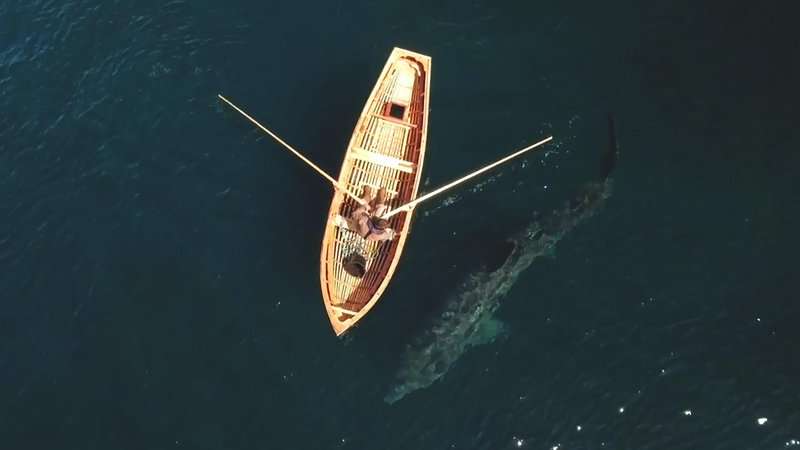
Swimming With Sharks
It is clear that swimming with sharks even in a cage can be somewhat terrifying. However, swimming right beside them without really any protection seems like suicide. Yet this diver seemed to have no problem with that. We’re not exactly sure if he has some sort of mental issue. You do not need to have thalassophobia to think this is insane to do. Just looking at the image makes us a bit squeezy. The sharks could attack, though studies show that they do not like eating humans very much.
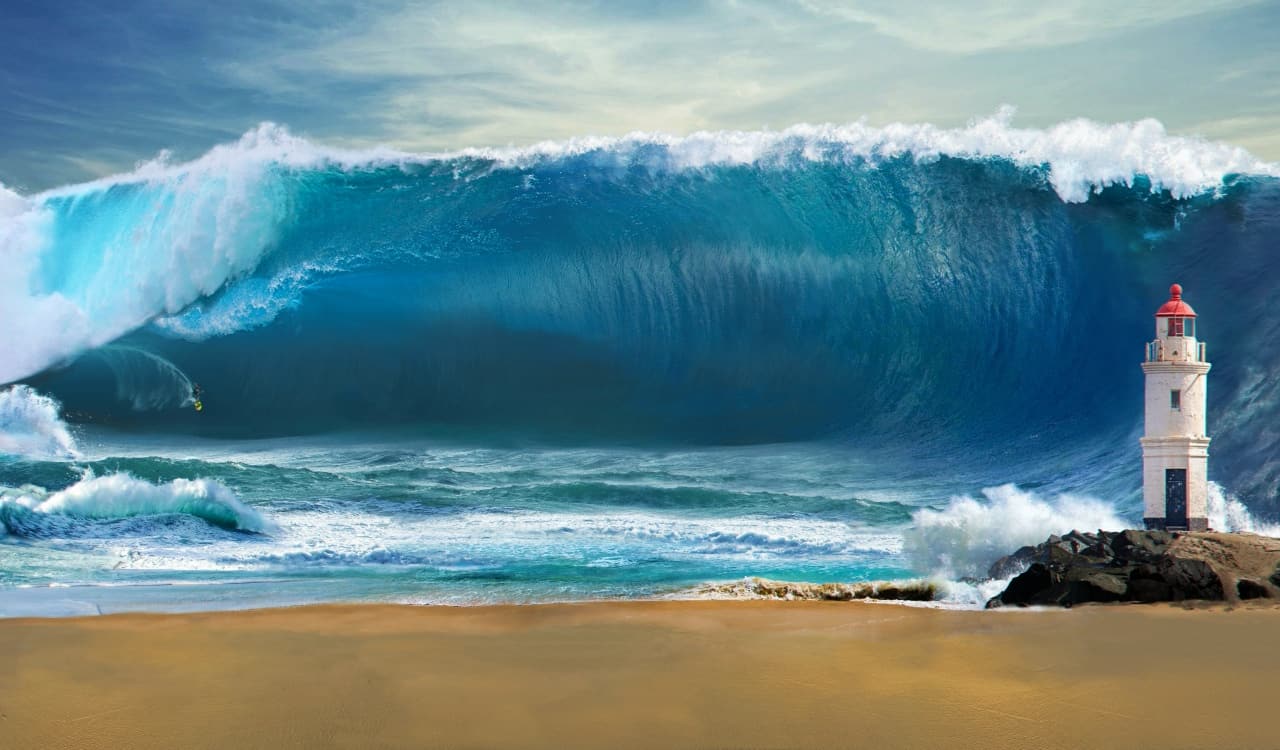
The Crushing Weight of the Ocean
Many territories still have lighthouses near shorelines, especially those that have rocky shores. The lighthouse feature goes back thousands of years. They were put in place to help people see where land was during storms or during the night, as it can be really hard to see them. Due to so many shipwrecks happening on shores like this, it seemed like a good idea to have a light on to help them. However, lighthouses can only survive so much. Waves like this can tear right through many of them.
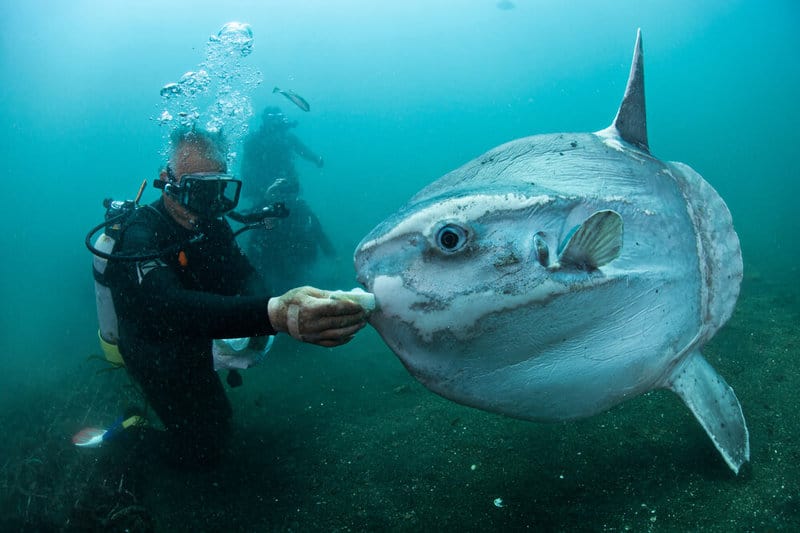
Giants of the Ocean
Sunfish are pretty incredible creatures. While they are found worldwide, they tend to thrive the best in tropical, warmer territories. They love being close to the surface, basking in the sun, hence the name. Many are pretty large, but they do not always become gigantic. This particular sunfish actually broke a record for being the largest bony fish of any kind, topping the scales at over 5,000lbs. It looks like a giant alien fish species that could eat the diver pictured!!
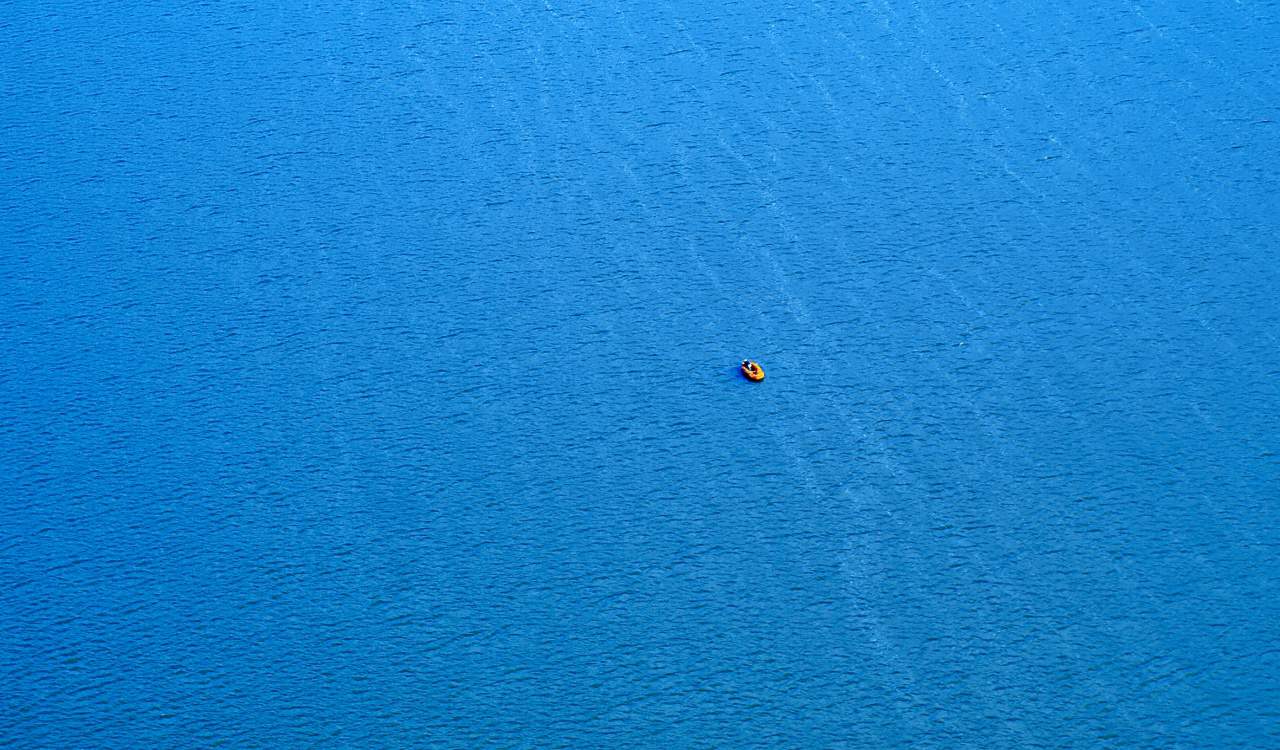
Floating Alone, In The Middle Of Nothingness
You’ll barely be able to see it, but that small dot-like thing is a life-raft. Clearly, it is a raft all alone in hundreds to thousands of miles of water. This person will be rescued, but others in their situation are not always that lucky. There are some who float around in a raft for days, weeks, and months before they are rescued. Some are never rescued at all. Others might end up hitting land, creating an entirely different survival situation depending on where they are.
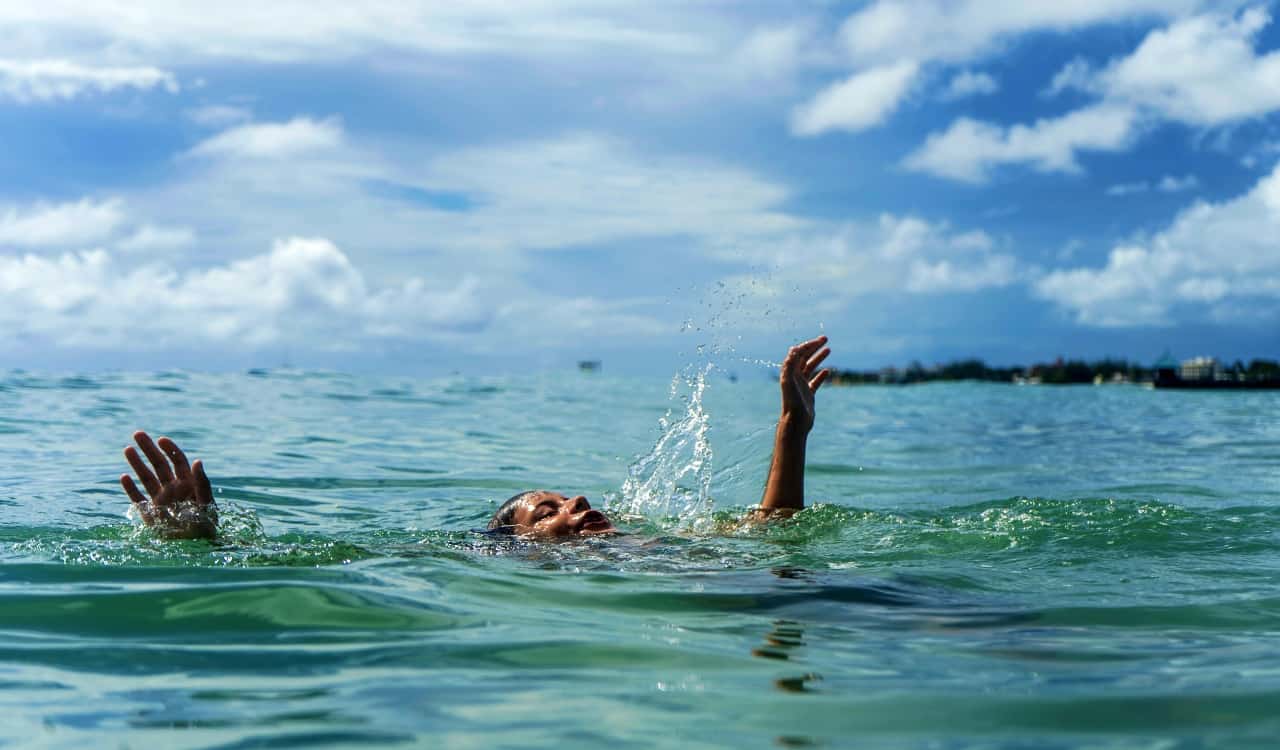
The Most Horrific Thalassophobia Thought: Drowning
When asked, one of the biggest things people with thalassophobia claim to fear about being in the water is the potential of drowning. To be fair, this is a fear many might have even if they do not have the same phobia. Of course, even those who love being around water all the time will not want to drown either. It is not usually a goal for anyone to reach. This is why it is always best to learn how to swim and never go out swimming alone, just in case.
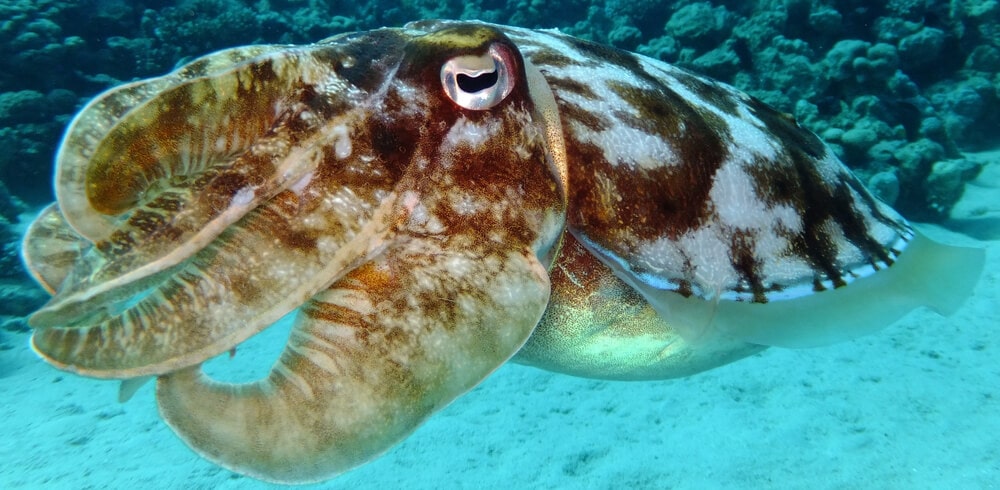
Tentacles Grabbing You From Nowhere
From the world of mythology, the Kraken was essentially a giant squid that would attack ships in the ocean. In some stories, the creature was controlled by someone. Yet in other stories, it operated as its own sentient entity. Chances are if you had thalassophobia or anything similar in ancient times…you’d likely be terrified to go anywhere. Who could blame you? If we heard stories of a giant squid in the water, we certainly would stay far away from the oceans or any major open water source.
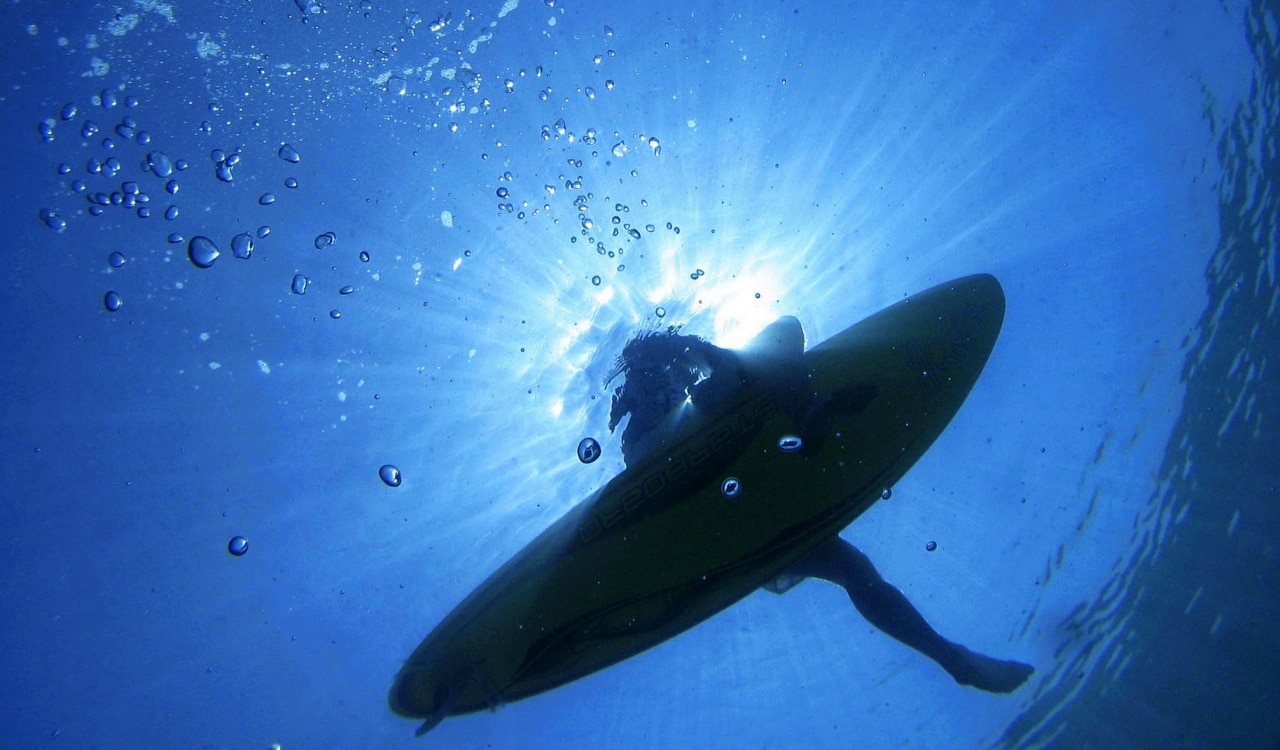
Far From Home
An issue many with thalassophobia struggle with is being far from land. It is the distance that seems to be the biggest problem. It could be that they feel trapped on a ship now that land is further away than it used to be. The further out into the deep blue it gets, the worse symptoms might get. Anxiety can be difficult to deal with, as well as stress. People on cruises deal with this so often that staff offers medication or patches to help calm people down.
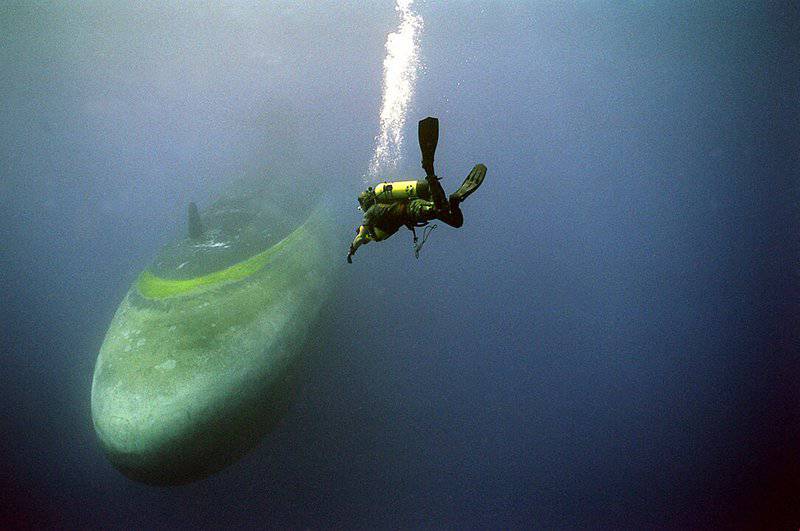
Sunken Curiosities Seem Foreboding
There are some who have the interesting job of finding old ships that sunk somewhere in the ocean. While some ships are sunk on purpose by the Captain, others were taken out or accidentally sunk. Normally, if a ship is sunk by another party, it is unlikely it will contain any valuable cargo. Accidental shipwrecks could contain things like gold and silver. Thus, you can understand why people explore them. However, many with thalassophobia claim seeing ships sunk like this freaks them out.
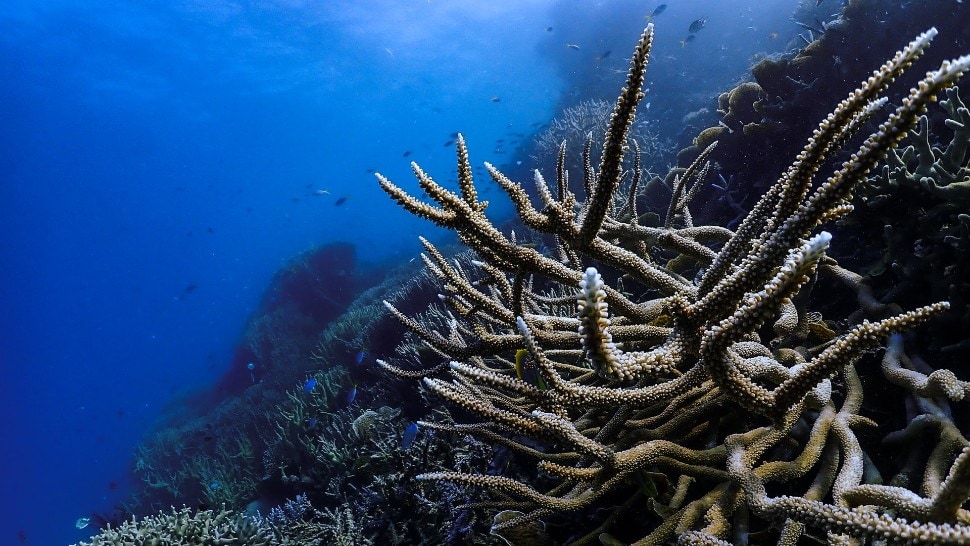
Reefs are Hotbeds for phobia-inducing Activity
While there is not an “exact” phobia that is reef specific, some with something called tryphophobia tend to have deep fear or anxiety around them. Those with thalassophobia may not have a major fear of reefs specifically. Yet due to the fact that they can only be found in random shallow pockets in otherwise deep oceans, it connects some. If it makes those with phobias of reefs feel better, due to climate change, beautiful images like what you see above might be a thing of the past soon.
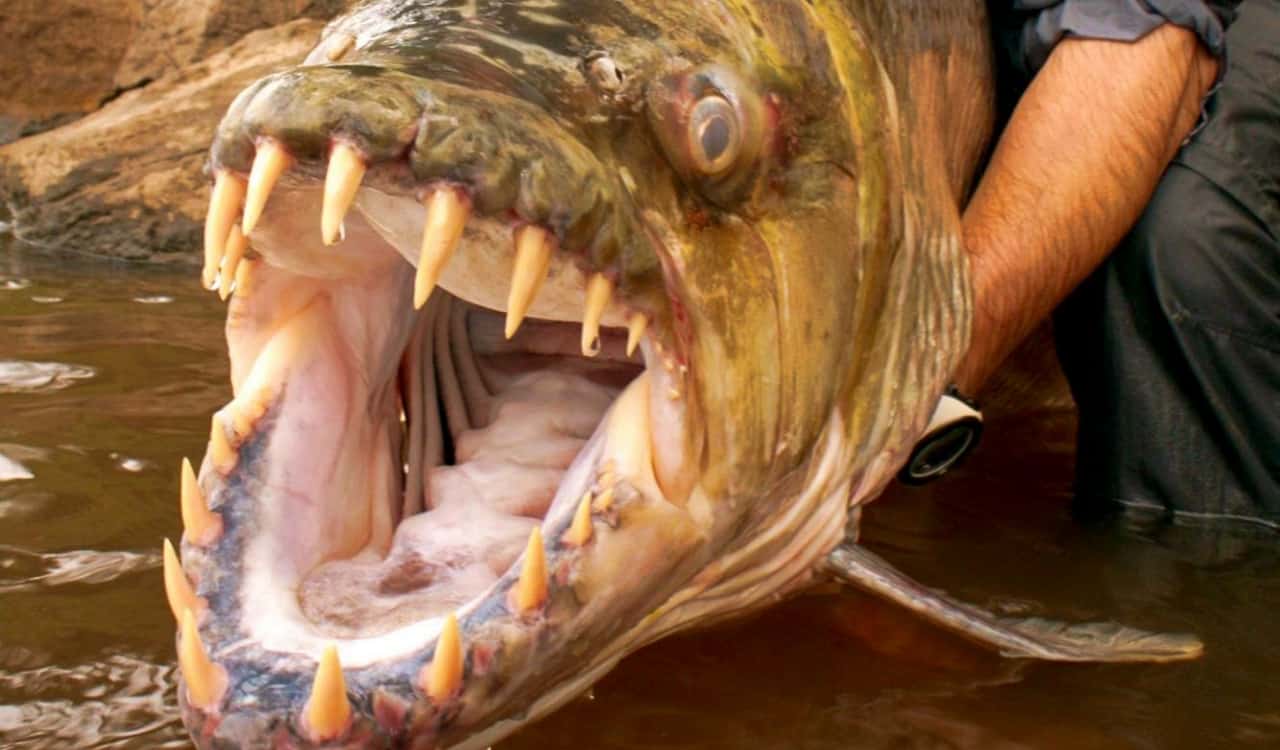
The Real Mega-Piranha
In the movies, we see a lot of monsters formed just to scare us but the mega-piranha is quite real. They DO attack humans and they HAVE killed people before. Most people did not believe they existed until Jeremy Wade of River Monsters fame found one during an investigation for his show. That very piranha is pictured above with teeth as large as some sharks. Piranhas don’t normally just attack people, as they are attracted to blood in the water. Yet this big guy attacked just because it wanted to.
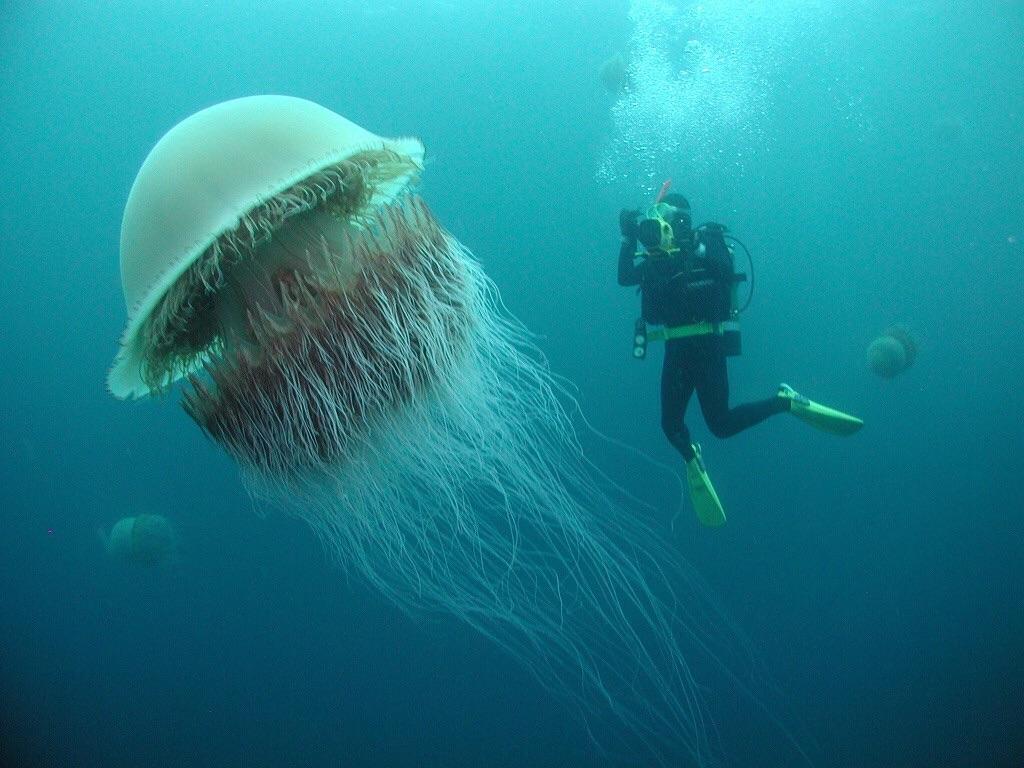
The Infamous Jellyfish
Some jellyfish can be found in shallow waters, but most of the time you’re only going to see them in deep areas of oceans worldwide. Potentially the largest amount is found near Australia & New Zealand. Yet due to climate change, infamous species types like the box jellyfish have begun navigating into other waters. This has resulted in several showing up near the Americas where they otherwise wouldn’t be present. Jellyfish stings are incredibly painful and they are not exactly fans of humans.
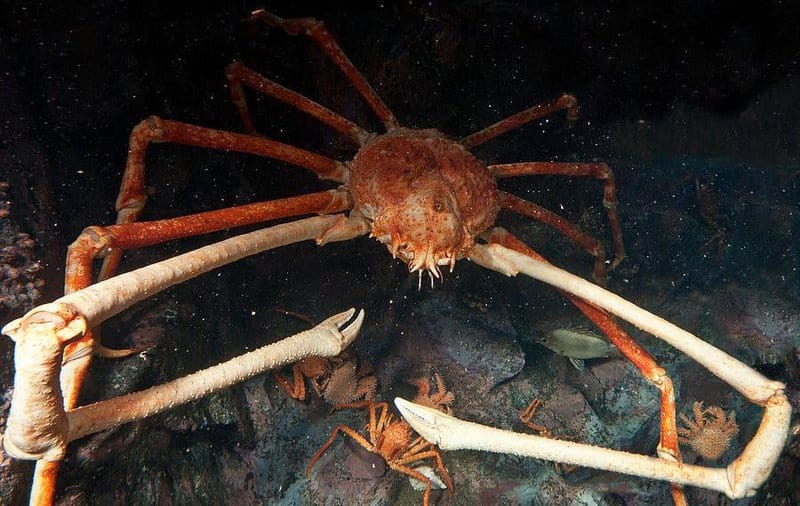
The Japanese Spider Crab
This crab gets its name honestly. The Japanese Spider Crab can be found in Japan, yet it has also managed to show up in other areas of Asia. Of course, they are incredibly unique. Due to that, you can find them in many aquariums all over the world too. You’d be forgiven for being thrown back a bit by their appearance. While this truly is a crab, the spider-like features make it much scarier. Worst of all, these creatures get to quite a large size too.
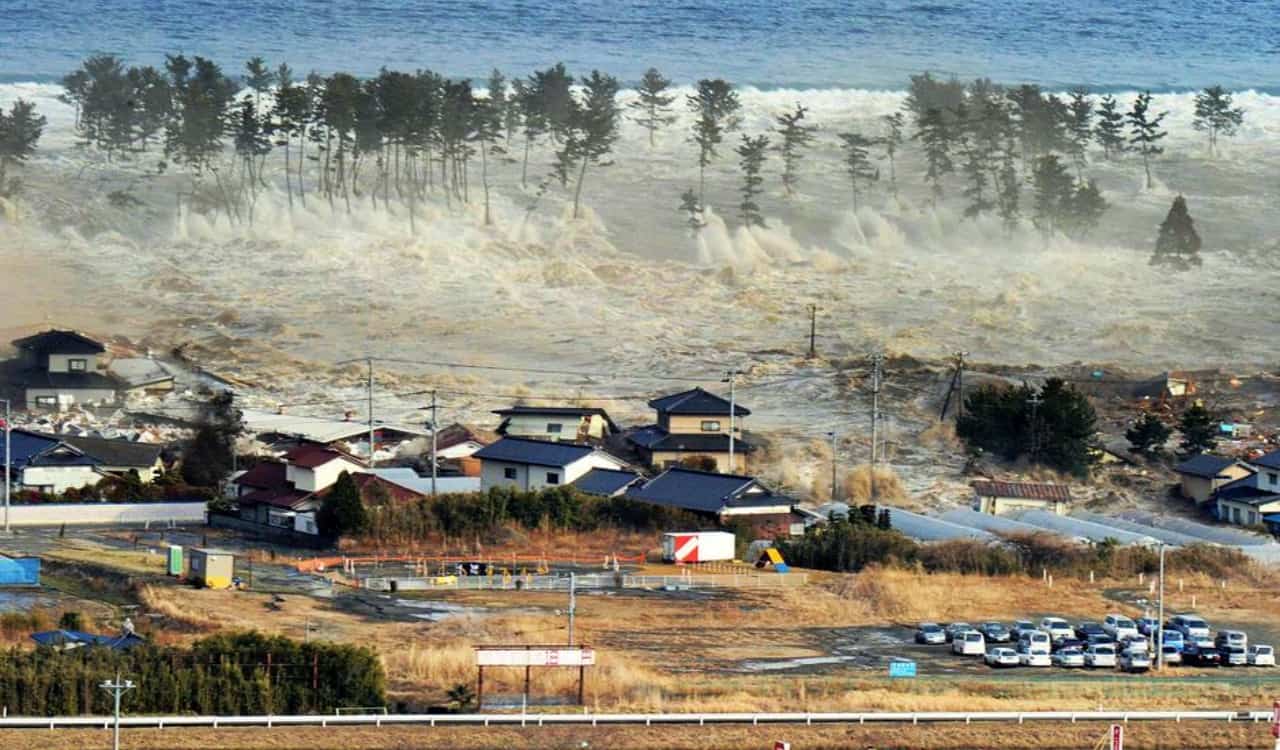
Japanese Tsunami
Japan is not just home to giant crabs, but they are also known for getting some pretty bad tsunamis too. Of course, many Asian territories such as the Philipines also deal with their fair share of them too. Tsunamis are unique events, and would likely make anyone anxious. Thus, you do not need thalassophobia to be afraid of them. This particular image shows giant waves destroying an area in Natori, Japan in 2011. Luckily, most of the area has recovered since this event.
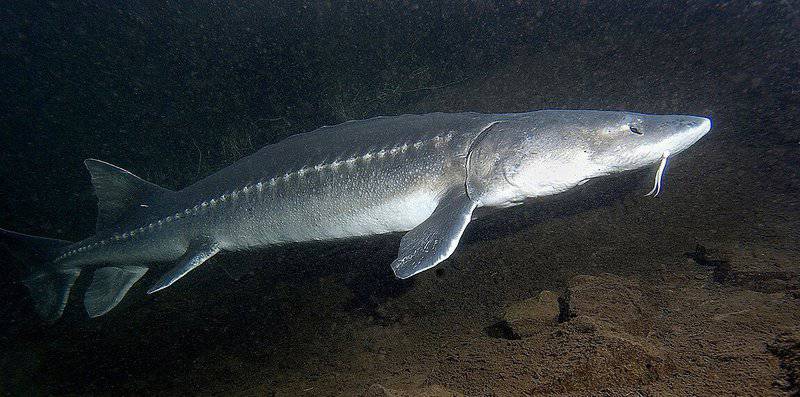
The Oddly Dangerous White Sturgeon
Weirdly, the white sturgeon is one of the most dangerous fish species. The man in the image above is named Jeremy Wade. He is known for following mysteries or legends about monstrous sea creatures for his show River Monsters. Wade has caught several fish over the years, but one he keeps coming back to is the white sturgeon. They attack humans at shorelines constantly. Interestingly, they hop around in both freshwater & saltwater during migration periods when not land-locked.
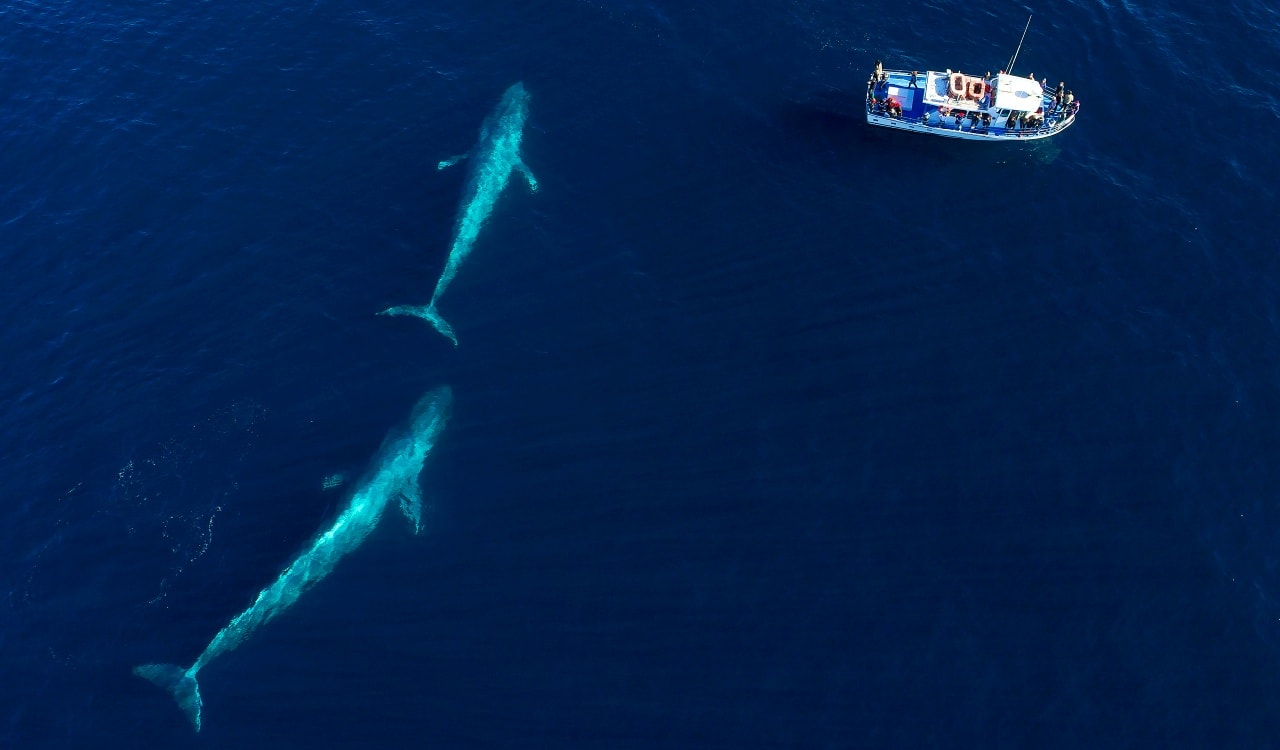
Massive Whales that Can Appear and Disappear
Blue Whales are beautiful creatures. They are the largest animal of any kind in the world today and hold the record for being the largest mammal to ever exist. Seeing one in the wild is relatively rare unless you know exactly where they navigate throughout a given year. However, due to their size, seeing them show up while you’re on the water can be horrifying for some people. Especially if you have thalassophobia, and experience something that the people in this boat above dealt with.
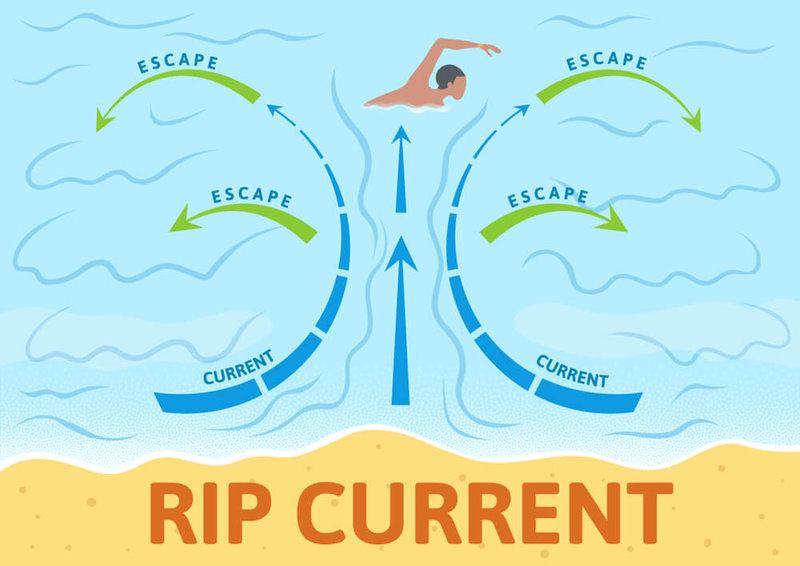
The Dangers Of Rip Currents
Rip Currents are incredibly dangerous. While a riptide usually comes in via the ocean, affecting the waves on the water, rip currents come onto the beach. Due to breaking waves having to crash out somewhere, water ends up on a beach. Yet it then has to go back in, which can sometimes cause people to get caught in one and be sucked out to sea. Above you’ll see an amazing situation where people made a human chain to save swimmers caught in one of these rip currents back in 2019.
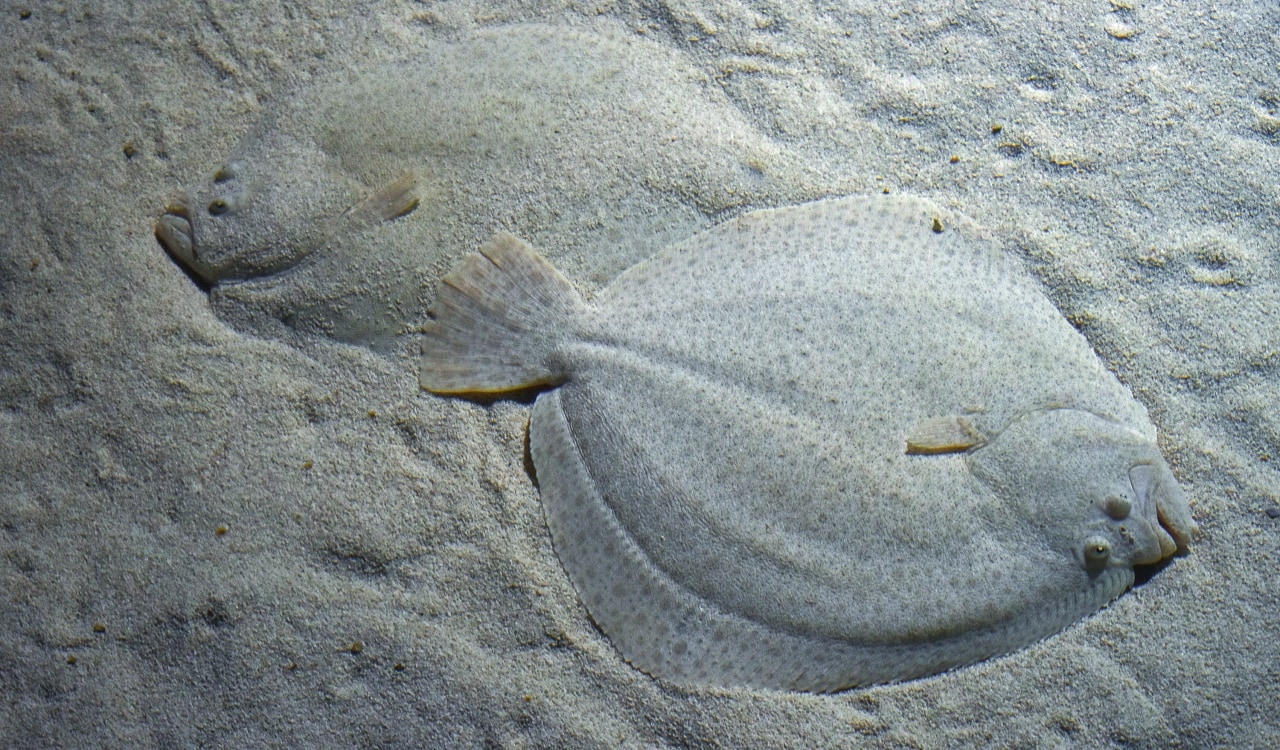
Fish that Can Camouflage
Flatfish are notorious for creeping people out when they go into waters around the world. They hide on the ocean floor to both avoid potential predators and catch their own prey. Pictured above are two turbot demersal flatfishes. You might assume they were fossilized based on how they look. However, they are merely in the sand just covered up, lying in wait. Flatfish are known for blending into an environment like this, so one could be right below you in the water and you might never know.
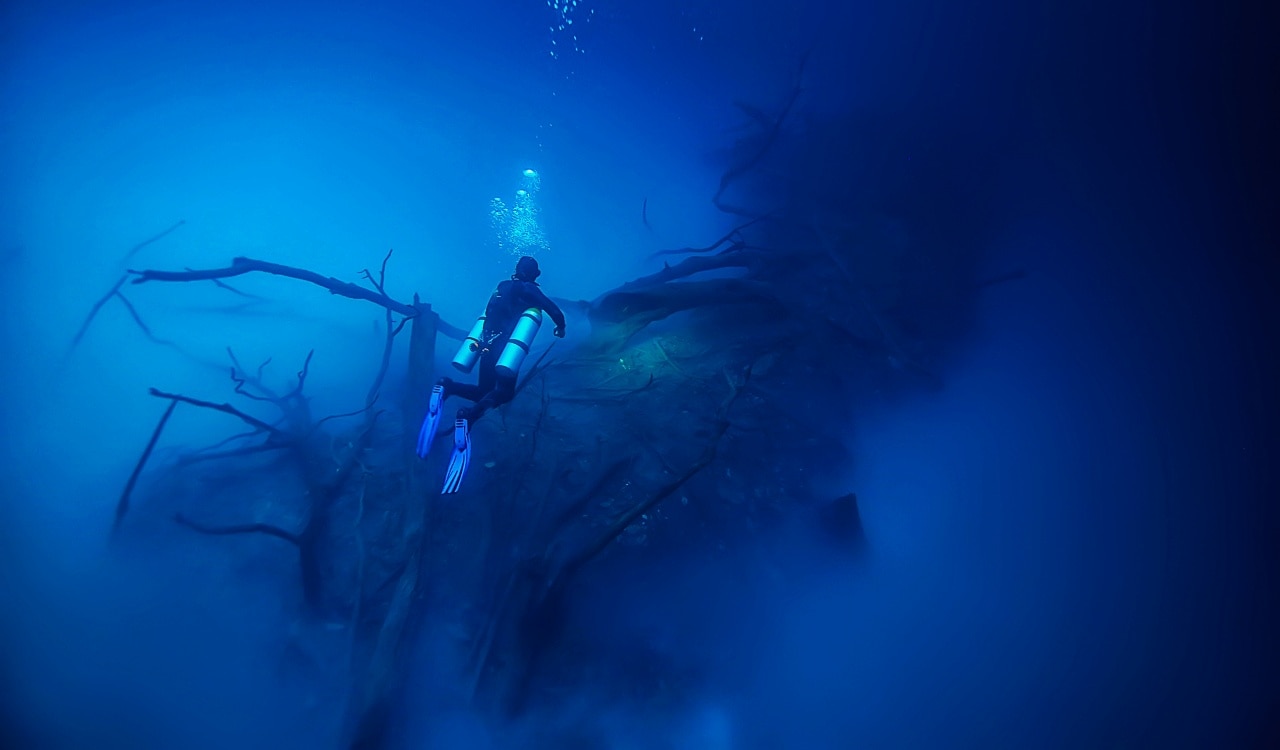
Underwater Fog
There are many places divers can go in the water. Sometimes, the water is a bit murky or very much so. Those waters can be eerie, but it is likely people with thalassophobia will be just as creeped out by the infamous “underwater fog.” This fog is pretty weird to see. We’re used to seeing it on the surface near water, but underwater it forms in a similar way. Complex interactions with ocean evaporation, atmospheric pressure, shore temps, etc. cause this to take place. It’s creepy regardless.
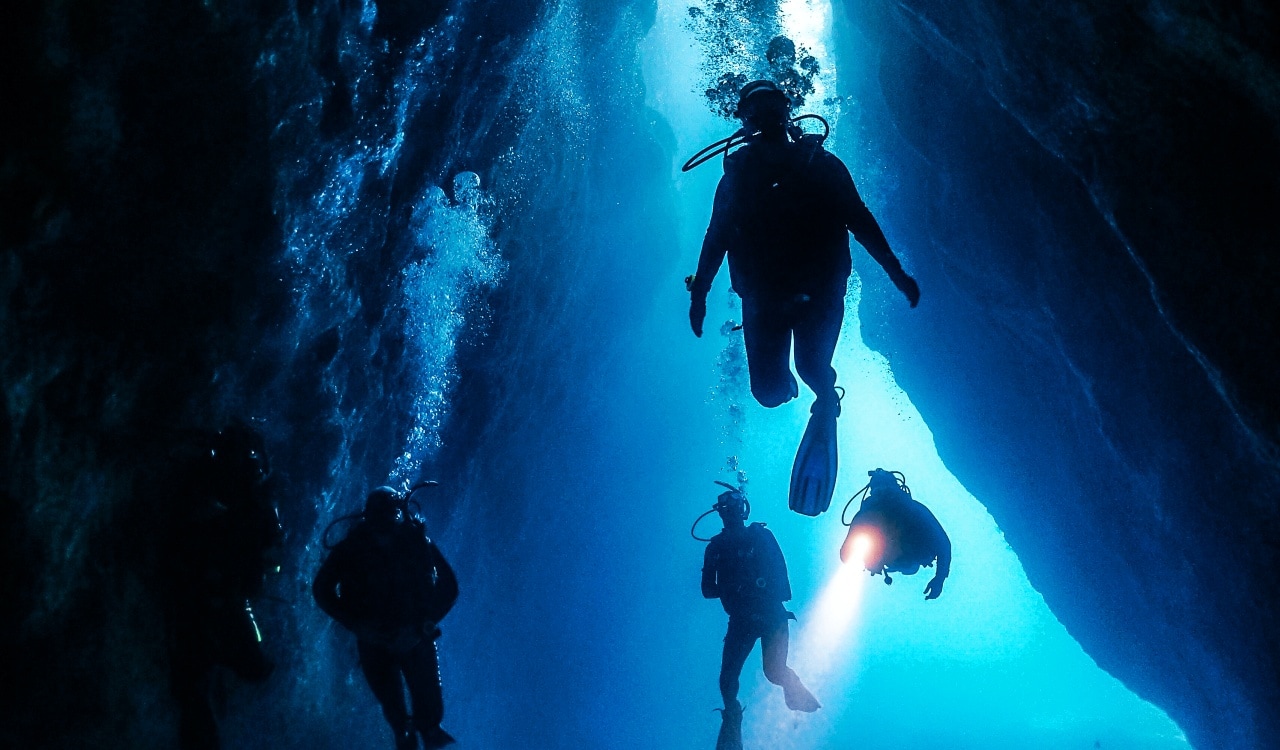
Cave Diving Horror
Cave diving, sometimes known as spelunking, is something many people love to do worldwide. Just going through and exploring caves can be pretty fun for people. Yet regular caves can be creepy to explore. Now add the underwater part to this exploration. Cave systems are known for being difficult to deal with. People get lost in them all the time and those are mostly just surface caves. Underwater versions could be horrifying, and may God help you if you’re lost or your equipment fails.
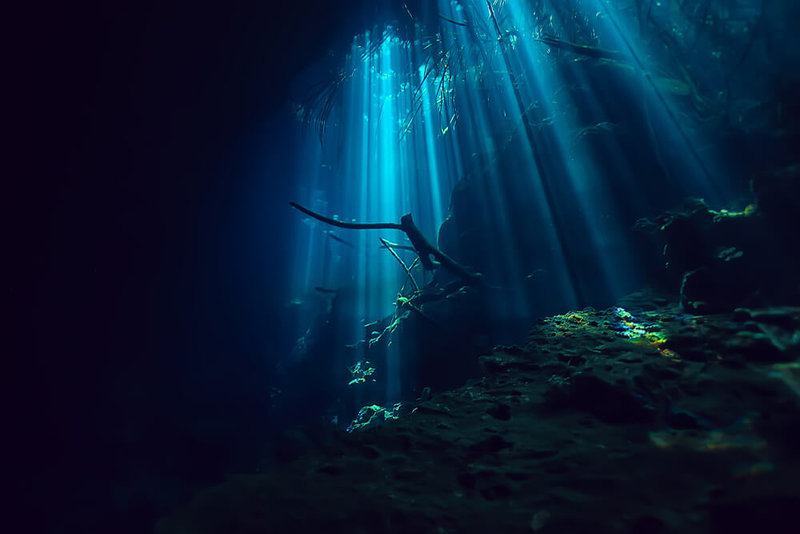
Underwater Rivers
Underwater rivers are quite jarring. The name, however, is misleading. The Cenote Angelita Cave you see above has one and displays the misunderstanding well. A halocline, or cloud of hydrogen sulfide formed by decomposed organic debris at the bottom of the cave, makes the saltwater separate from fresh groundwater. That groundwater comes from below and seeps into the saltwater. Making it appear to divers that they are swimming in an underwater river attached to an ocean source.

Volcano Eruption Underwater
If you know anything about the planet, you know we have volcanoes not just on land but also in the water. Of course, oceans have risen over millions of years. This means some volcanoes once high above land will not be partially or completely submerged. Yet they are still just as dangerous as other volcanoes. Being near one when it is erupting is possibly life-threatening. Moreover, these volcanoes give off enough energy to power cities as well as start-up tsunamis.
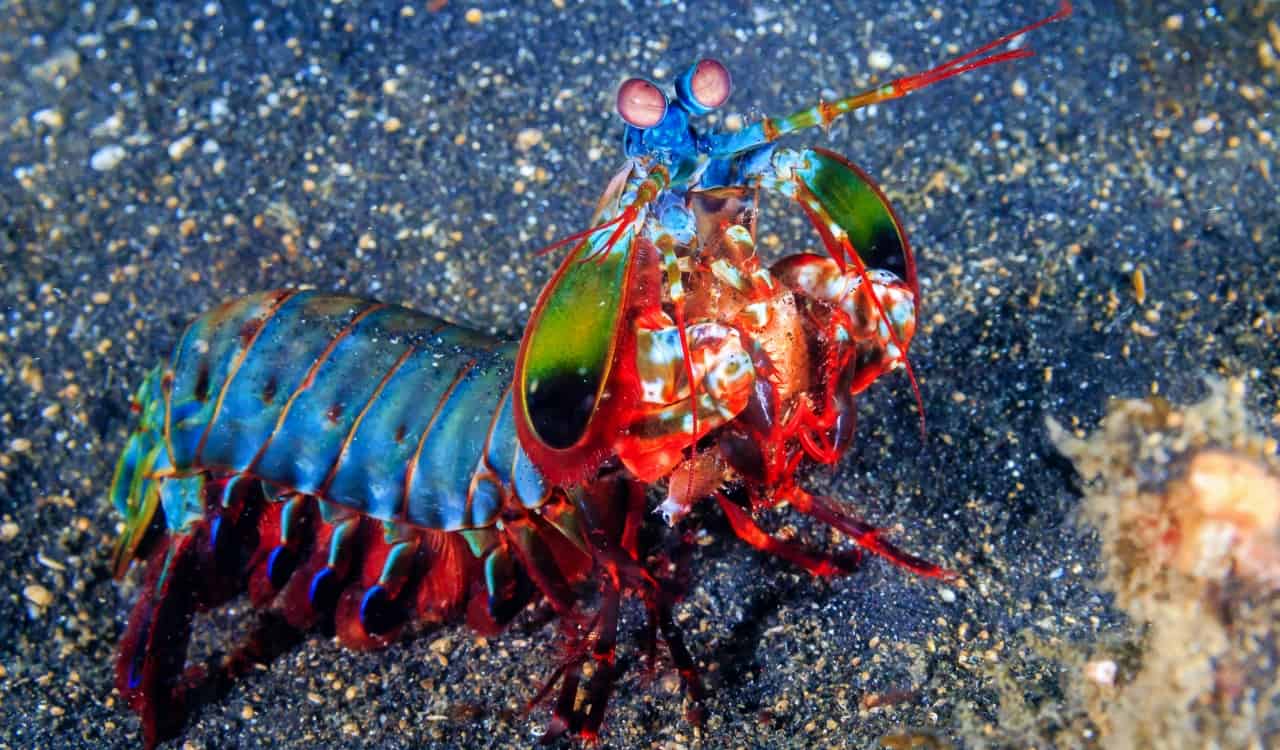
The Depths of the Ocean Holds Truly Bizarre Creatures
Some people with Thalassophobia have reported being weirded out by this little guy. It is known as a Mantis Shrimp, getting its name from its similarities to the Praying Mantis. While the species gets far larger than the insect as well as larger than many other shrimp species, it is still relatively small. Humans have come into contact with them many times and did not have issues, but some did. The infamous punch from this shrimp is painful, and attacks can leave humans with some bad injuries.
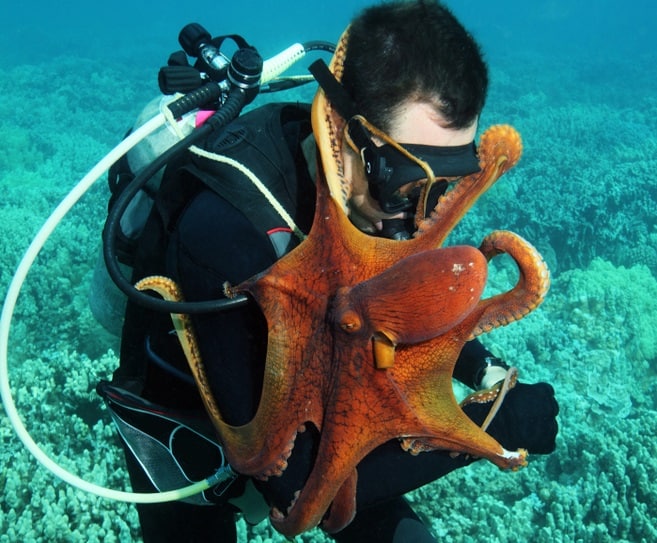
Octopus Attacks
Most will tell you that if you leave them alone, octopi will leave you alone. An octopus rarely ever goes on the attack, especially against humans. They can be territorial though, so getting too close might cause this. Other times, they might be a little angrier than humans expect. The man above experienced this the hard way. An octopus was not happy with him being there and decided to attack him, taking away his camera along the way. Must not be a fan of being put on video without permission!
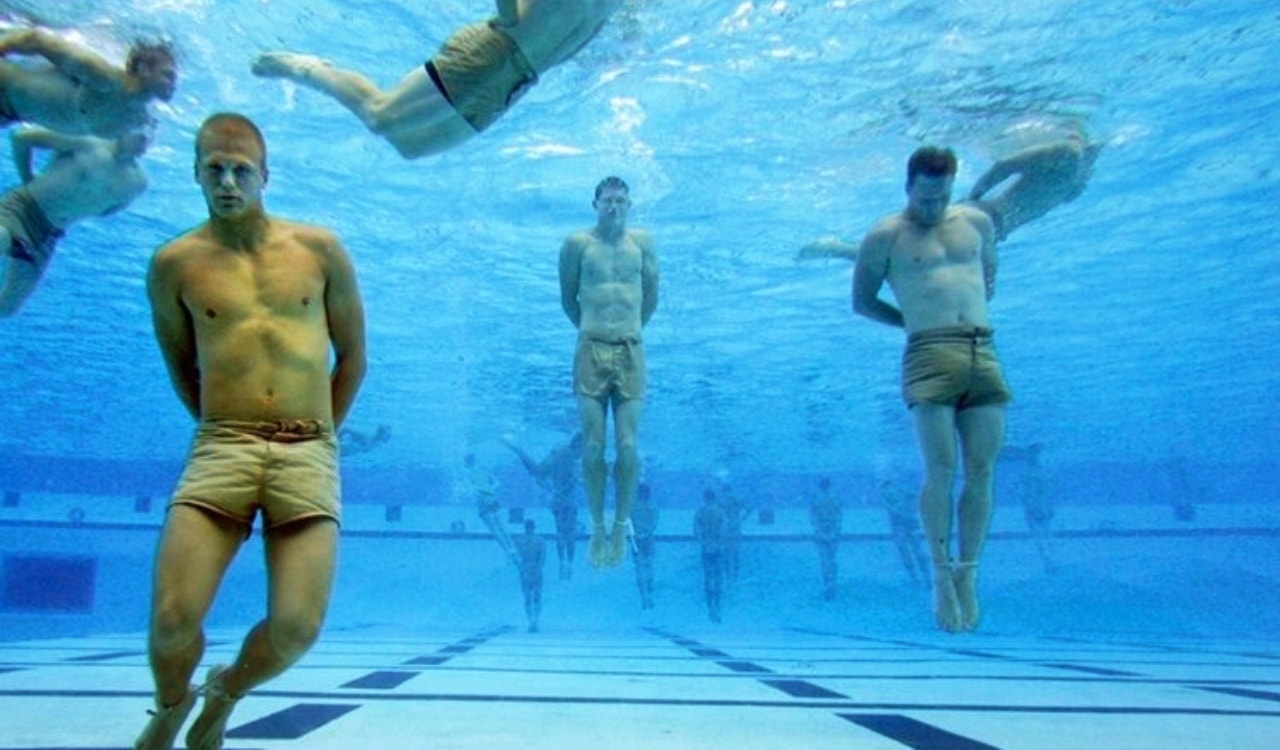
How The U.S. Navy Drownproofs SEALs
The United States Armed Forces has some of the most well-trained, and toughest men and women on the planet. Yet it goes beyond just being able to handle a weapon or fight. Sometimes, you need to be prepared to avoid death. In the Navy, you’re put through a drown-proofing course. This is essential for Marines and SEALs who will likely be around the water a lot. They tie up your arms and legs and have you do specific things numerous times until you’re, well, drown-proof.

